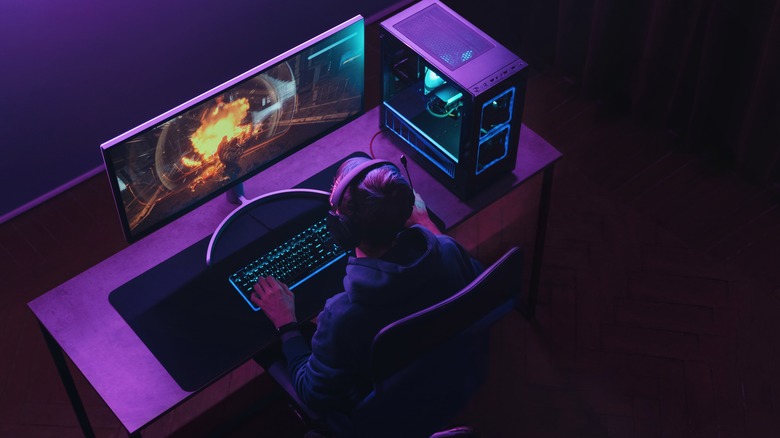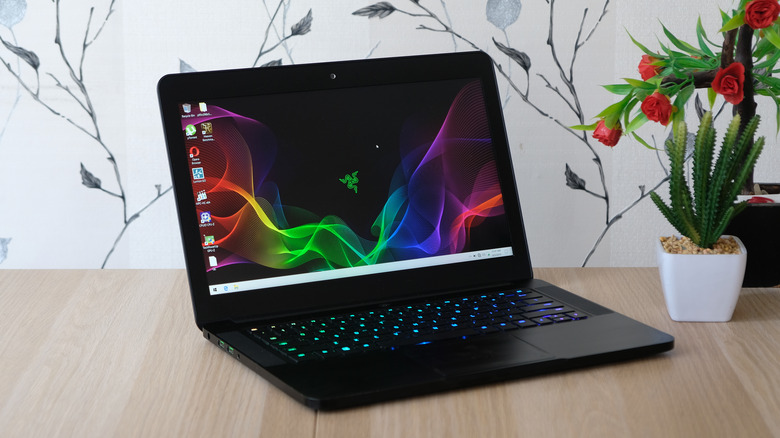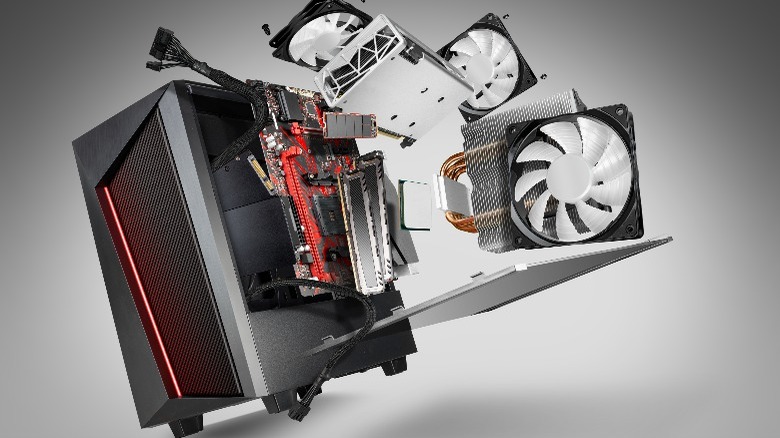Gaming Laptop Vs. Desktop PC: Which Computer Should You Get?
Video games might have gotten impressively advanced graphics-wise, but still serve the same great purpose of providing an escape to tired students and full-time jobholders alike. Be it an action-packed competitive match in "Counter-Strike," or a panoramic view of the night sky in "Genshin Impact" — there is nothing quite like unwinding your day with a relaxing gaming session.
Just as there are countless titles to download and enjoy, the hardware to run these games also comes in an abundance of forms. You have options not just between different gaming consoles like the Xbox Series X or the PlayStation 5, but also a healthy variety on the PC front — heck, gaming might be possible on a MacBook as well. Gaming-centric laptops are on the rise, with great offerings at nearly every price point — and the flexibility of custom-built gaming desktops is unmatched.
Choosing to ditch consoles for a powerful Windows computer is enough to make any PCMasterRace enthusiast proud. Alas, the big decision of picking between a gaming laptop or a desktop PC is all but simple. Is the temptation of a powerful and gorgeous rig enough to stop you from caving into the portability of a relatively sleek laptop? To ease off the dilemma a bit, we have gone over a few of the most important considerations you need to make before picking up your next gaming machine.
There is a considerable performance gap
One of the key differentiating factors between a regular computer and one that's designed to run games smoothly is performance. There are a couple of independent components in a computer that, when combined, are able to dictate the overall performance of the rig — namely, the CPU, GPU, RAM, and storage. When building or buying a desktop PC, you have a generous selection of great budget CPUs for gaming, the same way you do with some of Nvidia's best budget-friendly graphics cards. When it comes to RAM and storage — the faster, the better.
Not only do gaming desktops benefit from a wider compatibility of components, but they are more often than not considerably better in performance compared to their laptop counterparts. Video card manufacturers like Nvidia tend to use the same naming convention on both their desktop and laptop-tier graphics cards. Unsurprisingly, even two GPUs of a similar model have variations in performance depending on which form factor they've been designed around. As evidenced by this comprehensive test carried out by TechSpot, a similarly named RTX 4090 GPU in a desktop PC is significantly more powerful than its laptop version.
Due to physical limitations in both size and thermal efficiency, you could expect a similar story when comparing what seems to be the same CPU on a desktop PC and a gaming laptop. So, if you're in it for the best graphics money can buy, a gaming desktop is the clear winner.
Do you value portability?
This one's going to be an easy decision. If you even remotely want the convenience of carrying your game library with you, a laptop is the way to go. Where gaming laptops fall short in terms of performance per dollar, they make up for it in the mobility department. This is not to say that all gaming laptops are easy to traverse your daily commute with. A moderately spec'd gaming laptop could still be north of 5 pounds — and while this is infinitely better than attempting to chug around a desktop computer, the thin and sleek ultrabooks crush other PC form factors when it comes to true portability.
Space constraints go hand in hand when dealing with a gaming desktop. Unlike a laptop that is self-sufficient, you'd need to set up a monitor, keyboard, mouse, and potentially other peripherals to be able to enjoy gaming with a desktop computer. Even if you pick the likes of the pocket-sized Geekom AS 6 PC, you sacrifice on overall performance and are still missing at least three compulsory I/O devices.
With a gaming laptop, no matter the weight, all you need to worry about is the powerhouse itself, a charging adapter, and ideally, an external mouse. Being battery-powered could come in clutch in certain scenarios, but expect heavy performance drops when playing on a gaming laptop that isn't connected to hardline power.
Laptops are usually the whole package
Unlike desktops where you have to shell out extra for a display and other peripherals, what makes laptops portable is the attached screen and keyboard. This might be an important consideration if you're on a budget, since the price stacks up eventually if you go the desktop PC route — seeing how some of the best gaming mice, keyboards, monitors, and other peripherals typically don't come cheap. Most laptops also come with built-in support for Bluetooth and Wi-Fi, which you might have to end up jerry-rigging using third-party accessories on a desktop computer.
If it's an urgent Zoom meeting you have to attend in between gaming sessions, you will also benefit from the baked in webcam of a laptop. This is not to say that you cannot enjoy the experience of a bigger screen and a tactile mechanical keyboard when working with a palmtop. With the right setup and a single dongle, you can dock your gaming laptop and transform it into a desktop environment for some serious battle royale action. Put simply, purchasing a single device like a laptop that packs in everything you need can be much less of a hassle if you're short on both time and patience to bring together a desktop PC.
Cost and upgradability are difficult with a laptop
Perhaps the biggest factor to sway your opinion would be cost and potential. Cutting to the chase, a gaming desktop computer will almost always be more affordable than a gaming laptop with similar (if not better) performance levels. This simply comes down to the effort it takes to compress and pack everything into a machine you can carry around.
Gaming desktops utilize standardized components with very little need for any custom fitting. Laptop manufacturers, on the other hand, have to deal with soldering most of the components to the board in a way that maximizes thermal efficiency. This unfortunately limits the upgradability aspect of gaming laptops by an immense degree as well.
Short of maybe swapping RAM and adding a faster SSD, you are stuck with what you've paid for. A gaming desktop, conversely, can be refreshed as long as the new components talk nicely to one another — and as explored earlier, compatibility is typically a non-issue thanks to the huge catalog of PC parts, components, adapters, and other workarounds. For instance, if you ever feel the need to run more demanding apps simultaneously, you can always buy additional RAM sticks, or upgrade to a beefier graphics card for when "Grand Theft Auto 6" finally rolls out.




